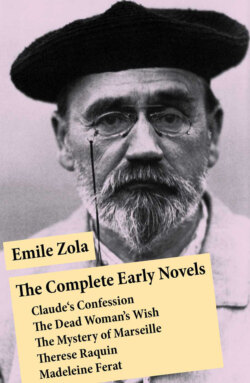Читать книгу The Complete Early Novels - Emile Zola - Страница 3
На сайте Литреса книга снята с продажи.
DEDICATION.
ОглавлениеTable of Contents
To my Friends, P. Cézanne and J. B. Baille.
You knew, my friends, the wretched youth whose letters I now publish. That youth is no more. He wished to become a man amid the wreck and oblivion of his early days.
I have long hesitated about giving the following pages to the public. I doubted my right to lay bare a body and a heart; I questioned myself, asking if it was allowable to divulge the secret of a confession. Then, when I re-read the panting and feverish letters, hanging together by a mere thread, I was discouraged; I said to myself that readers would, doubtless, accord but a cold reception to such a delirious and excited publication. Grief has but one cry: the work is an incessant complaint. I hesitated as a man and as a writer.
At last, I thought, one day, that our age has need of lessons and that I had, perhaps, in my hands, the means of curing a few wounded hearts. People wish poets and novelists to moralize. I knew not how to mount the pulpit, but I possessed the work of blood and tears of a poor soul — I could, in my turn, instruct and console. Claude’s avowals had the supreme precept of sobs, the high and pure moral of the fall and the redemption.
I then saw that these letters were such as they should be. I have no idea how the public will accept them, but I have faith in their frankness, even in their fury. They are human.
Hence, my friends, I resolved to publish this book. I took my decision in the name of truth and the general good. Besides, looking above the masses, I thought of you: it would please me to relate to you again the terrible story, which has already filled your eyes with tears.
This story is bare and true even to crudity. The delicate may not like it, but it will teach them a lesson they cannot fail to profit by. I have not felt at liberty to cut out a single line, being certain that these pages are the complete expression of a heart in which there was more light than darkness. They were written by a nervous and loving youth, who gave himself entirely to them amid the quivering of his flesh and the bounds of his soul. They are the morbid manifestation of a special temperament, which had a bitter need of the real and the false but sweet hopes of a dream. The whole book is a struggle between illusion and reality. If Claude’s strange love-affair should make people judge him severely, they will pardon him at the dénouement, when he lifts himself up, younger and stronger, relying upon God.
There was an apostle in Claude. He tells us of his desolated youth, shows us his wounds and cries aloud what he has suffered that his brethren may avoid like sufferings. These are evil times for hearts which resemble his.
I can in a word characterize his work, accord him the highest praise that I desire as an artist, and, at the same time, reply to all the objections that may be made:
Claude’s aspirations were too lofty.
ÉMILE ZOLA.
